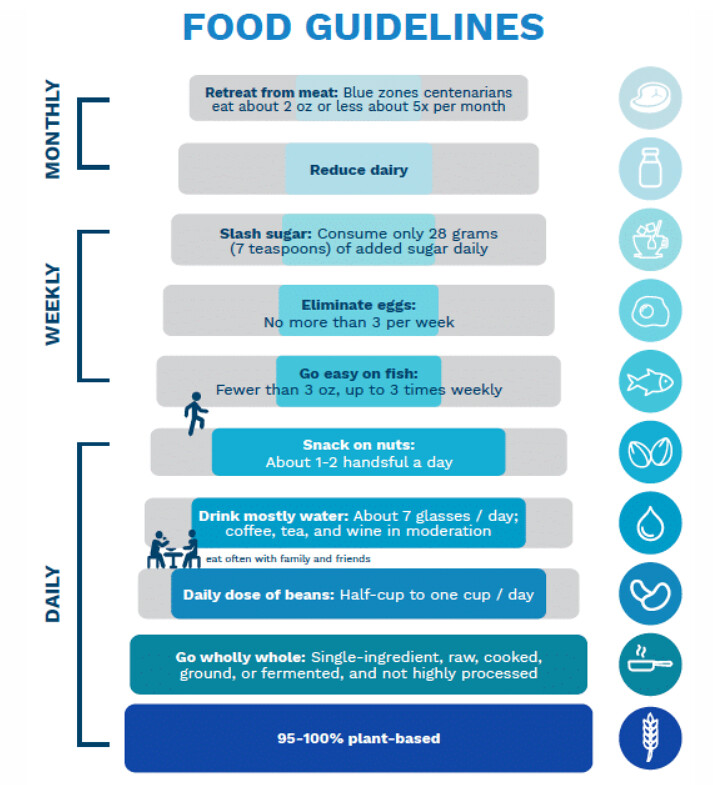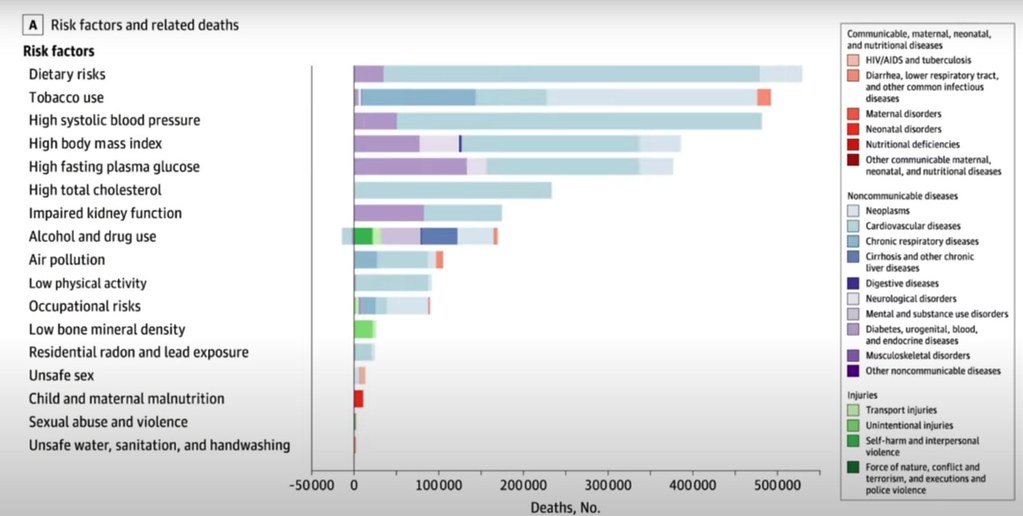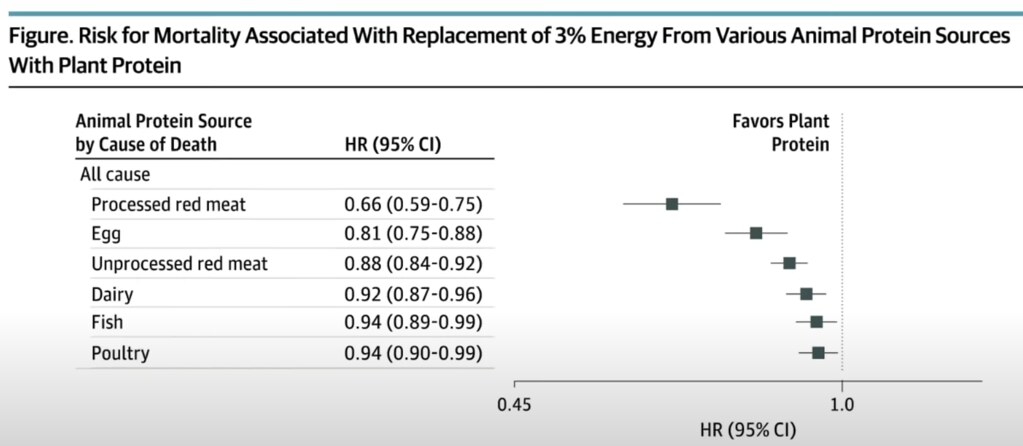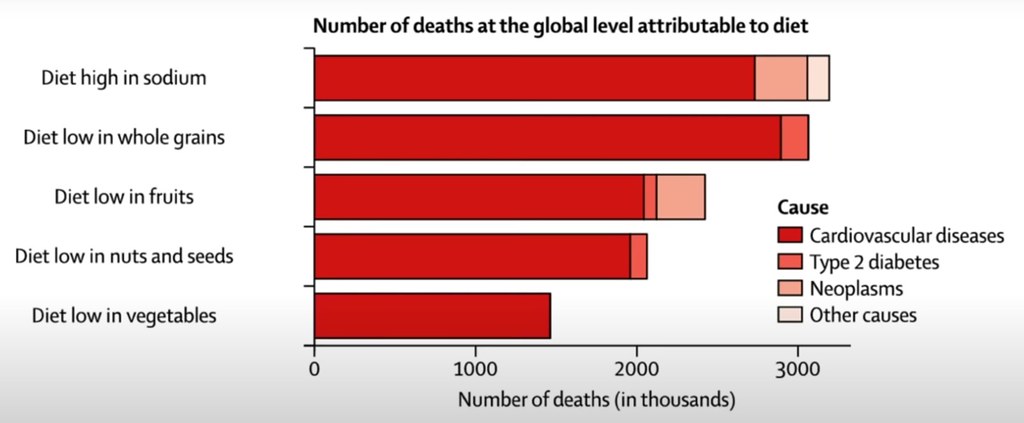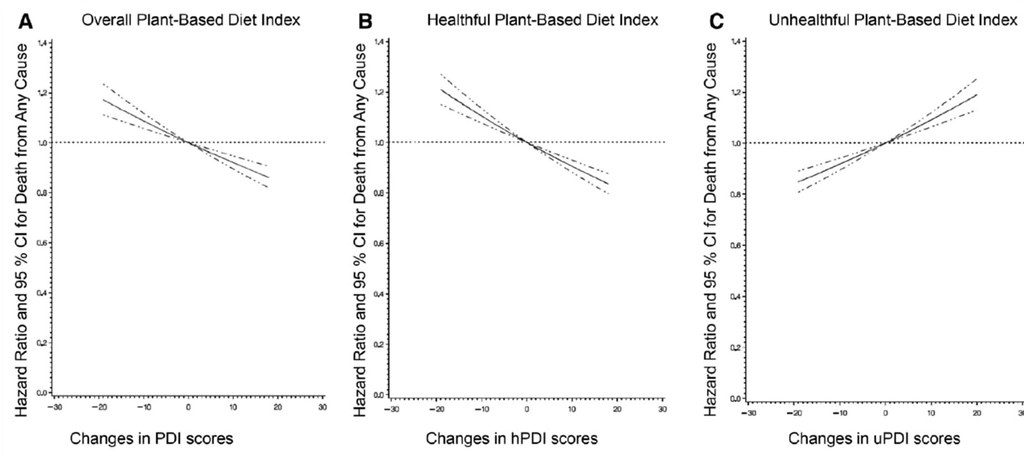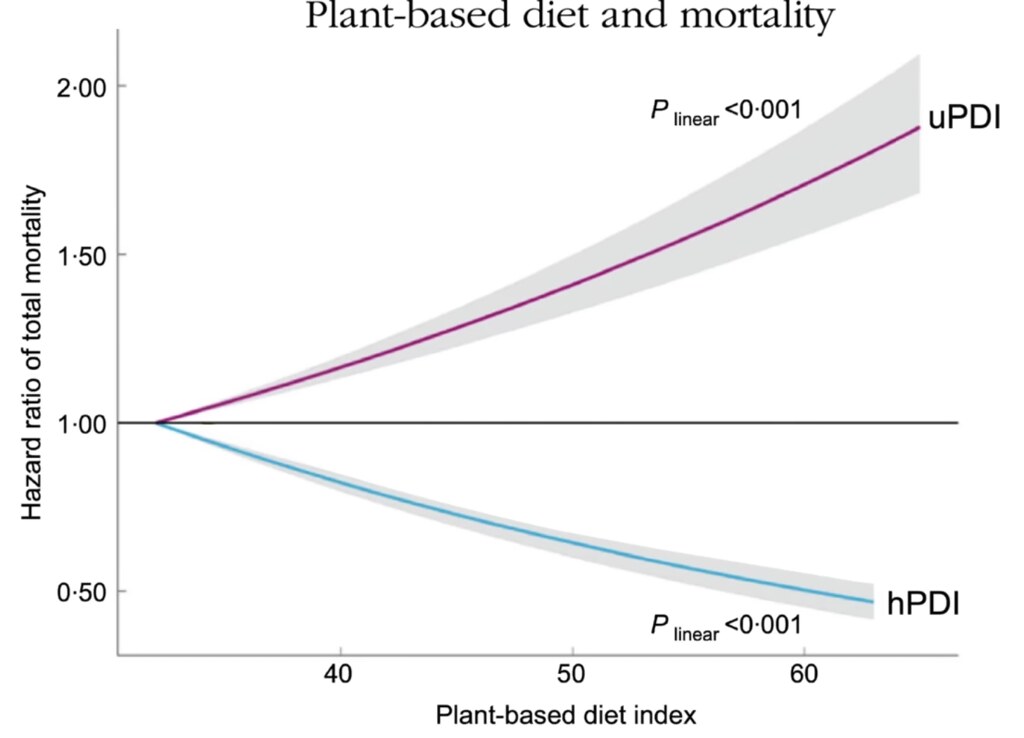One of the most important takeaways for me from these segments was the importance of eating a healthy plant-based diet. If you eat ultra-processed vegan foods, you’re likely not improving your health! I know this but the data Dr. Greger brings to bear helps reinforce the need for healthy whole food, plant-based diet instead unhealthy but convenient, hyper-palatable, ultra processed food.
[21:25] Habits of longest-living populations
- (from How Not to Age Part II: Optimal Anti-Aging Regimen)
- Odds of living to 100 have increased to 1 in 50 for women in low-mortality areas
- Twin studies suggest only 25% of lifespan variation explained by genetics
- Blue Zones – areas of exceptional longevity around the world [27]
- Five Blue Zones identified around the world
- Loma Linda, CA, USA, Sardinia, Greece, Okinawa, Costa Rica
- Common Blue Zone lifestyle characteristics [29]
- family coherence,
- avoidance of smoking,
- plant-based diet,
- moderate and daily physical activity,
- social engagement, where people of all ages are socially active and integrated into the community
- Number 1 risk factor is American diet
- A sustained change from a typical Western diet to the optimal diet from age 20 years would increase LE by more than a decade for women from the United States (10.7 [95% UI 8.4 to 12.3] years) and men (13.0 [95% UI 9.4 to 14.3] years). [31]
- The largest gains would be made by eating more legumes (females: 2.2 [95% UI 1.1 to 3.4]; males: 2.5 [95% UI 1.1 to 3.9]),
- [more] whole grains (females: 2.0 [95% UI 1.3 to 2.7]; males: 2.3 [95% UI 1.6 to 3.0]), and
- [more] nuts (females: 1.7 [95% UI 1.5 to 2.0]; males: 2.0 [95% UI 1.7 to 2.3]), and
- less red meat (females: 1.6 [95% UI 1.5 to 1.8]; males: 1.9 [95% UI 1.7 to 2.1]) and
- [less] processed meat (females: 1.6 [95% UI 1.5 to 1.8]; males: 1.9 [95% UI 1.7 to 2.1]).
- Changing from a typical diet to the optimized diet at age 60 years would increase LE by 8.0 (95% UI 6.2 to 9.3) years for women and 8.8 (95% UI 6.8 to 10.0) years for men, and
- 80-year-olds would gain 3.4 years (95% UI females: 2.6 to 3.8/ males: 2.7 to 3.9)
- Does eating healthy actually slow down aging?[33]
- “Women who participated in the dietary intervention had a significant slowing of the DNAmGrimAge clock” [34]
- “It’s not just about adding years to your life but life to your years.”
- Unhealthy Aging Measure called Deficit Accumulation Index (DAI)
- Deficit Accumulation Index. At each wave, unhealthy aging was measured using a 52-item DAI with 4 domains: functional impairments, self-reported health/vitality, mental health, and morbidities/use of health services.
“…. substitution of 1% of energy from vegetable protein for an equal amount of total animal protein, dairy protein, or meat protein also led to significantly less deficit accumulation.” ” [35]
- Deficit Accumulation Index. At each wave, unhealthy aging was measured using a 52-item DAI with 4 domains: functional impairments, self-reported health/vitality, mental health, and morbidities/use of health services.
- “Substituting 5% energy of animal protein with plant protein was associated with a lower risk of all‐cause mortality (HR, 0.86; 95% CI, 0.81–0.91), CVD mortality (HR, 0.78, 95% CI, 0.70–0.87), and dementia mortality (HR, 0.81, 95% CI, 0.68–0.97” [36]
- Unhealthy Aging Measure called Deficit Accumulation Index (DAI)
- Those who eat no meat at all are three times less likely to become demented
“The matched subjects who ate meat (including poultry and fish) were more than twice as likely to become demented as their vegetarian counterparts (relative risk 2.18, p = 0.065) and the discrepancy was further widened (relative risk 2.99, p = 0.048) when past meat consumption was taken into account. “ [37]
30:55 Healthy vs. unhealthy plant-based diets
- Ultra-processed foods
- “…. in high income and, increasingly, in middle-income countries, ultra-processed foods consistently account for more than 50% of dietary energy.”,[39]
- Ultra-processed foods associated with increase risk of dying prematurely
- Unhealthy plant-based diets are not associated with a lower risk of dying[40]
Healthy plant foods (hPDI) decreases risk of death
Unhealthy plant foods (uPDI) increases risk of death [42]
- Dr. Greger presented similar data for dementia and depression, frailty
- “In order to distinguish between healthful and unhealthful vegan diets that majorly include refined and processed foods, the term whole food, plant-based diet was developed by Dr. T. Colin Campbell in the early 1980s. The current definition of a plant-based diet is one that consists of all minimally processed fruits, vegetables, whole grains, legumes, nuts, seeds, herbs, and spices and excludes all animal products, including red meat, fish, poultry, eggs, and dairy products.”[44]
- Vegans can still benefit from whole food, plant-based diet [45]
References
- [27] A great book to read is Buettner D. The Blue Zones: 9 Lessons for Living Longer from the People Who’ve Lived the Longest. 2nd ed. National Geographic Books; 2012. Cited as 1486 and 2403 in How Not to Age Citations.
Dan Buettner has done much research on Blue Zones and has written other books. He also has a recent 2023 series on Netflix, Live to 100: Secrets of the Blue Zones
[28] Food guidelines. BlueZones.com. https://www.bluezones.com/recipes/food-guidelines/. Accessed 2 December 2023 Cited as 2393 and 2396 in How Not to Age Citations - [29] Panagiotakos DB, Chrysohoou C, Siasos G, Zisimos K, Skoumas J, Pitsavos C, Stefanadis C. Sociodemographic and lifestyle statistics of oldest old people (>80 years) living in ikaria island: the ikaria study. Cardiol Res Pract. 2011 Feb 24;2011:679187. doi: 10.4061/2011/679187. PMID: 21403883; PMCID: PMC3051199. https://www.ncbi.nlm.nih.gov/pmc/articles/PMC3051199/
Cited as 2392 in How Not to Age Citations - [30] Kahleova H, Levin S, Barnard ND. Plant-Based Diets for Healthy Aging. J Am Coll Nutr. 2021 Jul;40(5):478-479. doi: 10.1080/07315724.2020.1790442. Epub 2020 Jul 9. PMID: 32643581. Behind a paywall Available at https://www.researchgate.net/publication/342818806_Plant-Based_Diets_for_Healthy_Aging
Cited as 2147, 2150 and 2742 in How Not to Age Citations - [31] Fadnes LT, Økland JM, Haaland ØA, Johansson KA. Estimating impact of food choices on life expectancy: A modeling study. PLoS Med. 2022 Feb 8;19(2):e1003889. doi: 10.1371/journal.pmed.1003889. Erratum in: PLoS Med. 2022 Mar 25;19(3):e1003962. PMID: 35134067; PMCID: PMC8824353. https://www.ncbi.nlm.nih.gov/pmc/articles/PMC8824353/
Cited as 2216, 2406 and 2436 in How Not to Age Citations - [32] Song M, Fung TT, Hu FB, Willett WC, Longo VD, Chan AT, Giovannucci EL. Association of Animal and Plant Protein Intake With All-Cause and Cause-Specific Mortality. JAMA Intern Med. 2016 Oct 1;176(10):1453-1463. doi: 10.1001/jamainternmed.2016.4182. Erratum in: JAMA Intern Med. 2016 Nov 1;176(11):1728. PMID: 27479196; PMCID: PMC5048552. https://www.ncbi.nlm.nih.gov/pmc/articles/PMC5048552/
Cited as 3747, 3750 and 3752 in How Not to Age Citations - [33] Fiorito G, Caini S, Palli D, Bendinelli B, Saieva C, Ermini I, Valentini V, Assedi M, Rizzolo P, Ambrogetti D, Ottini L, Masala G. DNA methylation-based biomarkers of aging were slowed down in a two-year diet and physical activity intervention trial: the DAMA study. Aging Cell. 2021 Oct;20(10):e13439. doi: 10.1111/acel.13439. Epub 2021 Sep 18. PMID: 34535961; PMCID: PMC8520727. https://www.ncbi.nlm.nih.gov/pmc/articles/PMC8520727/
Not cited in How Not to Age Citations - [34] DNAmGrimAge clock, whereas increasing physical activity led to a significant reduction of SEMs in crucial cancer‐related pathways.” Since the article states: “stochastic epigenetic mutations (SEMs), also known as the epigenetic mutation load (EML), has been proposed as a complementary DNAm‐based biomarker of healthy aging.” then a reduction in SEMs would be beneficial. In other words, increased physical activity does “reduce” aging which is contrary to what Dr. Greger said
- [35] Ortolá R, Struijk EA, García-Esquinas E, Rodríguez-Artalejo F, Lopez-Garcia E. Changes in Dietary Intake of Animal and Vegetable Protein and Unhealthy Aging. Am J Med. 2020 Feb;133(2):231-239.e7. doi: 10.1016/j.amjmed.2019.06.051. Epub 2019 Jul 29. PMID: 31369726. Behind paywall but found at https://www.fisiogenomica.com/assets/Blog/pdf/Prote%C3%ADnas%2010.1016@j.amjmed.2019.06.051.pdf
Cited as 2762, 2763, 5535, 5664, and 7902 in How Not to Age Citations but the link is to the wrong paper - [36] Sun Y, Liu B, Snetselaar LG, Wallace RB, Shadyab AH, Kroenke CH, Haring B, Howard BV, Shikany JM, Valdiviezo C, Bao W. Association of Major Dietary Protein Sources With All-Cause and Cause-Specific Mortality: Prospective Cohort Study. J Am Heart Assoc. 2021 Feb;10(5):e015553. doi: 10.1161/JAHA.119.015553. Epub 2021 Feb 24. PMID: 33624505; PMCID: PMC8174240. https://www.ahajournals.org/doi/10.1161/JAHA.119.015553
Cited as references 951, 3752, 6763 and 7903 in in How Not to Age Citations - [37] Giem P, Beeson WL, Fraser GE. The incidence of dementia and intake of animal products: preliminary findings from the Adventist Health Study. Neuroepidemiology. 1993;12(1):28-36. doi: 10.1159/000110296. PMID: 8327020. Behind paywall
Cited as references 51, 744, 2747. 5048 and 5532 in in How Not to Age Citations - [38]
- GBD 2017 Diet Collaborators. Health effects of dietary risks in 195 countries, 1990-2017: a systematic analysis for the Global Burden of Disease Study 2017. Lancet. 2019 May 11;393(10184):1958-1972. doi: 10.1016/S0140-6736(19)30041-8. Epub 2019 Apr 4. Erratum in: Lancet. 2021 Jun 26;397(10293):2466. PMID: 30954305; PMCID: PMC6899507. https://www.ncbi.nlm.nih.gov/pmc/articles/PMC6899507/
Cited as references 1261, 2104, 2115, and 2163 in in How Not to Age Citations - [39] Adams J, Hofman K, Moubarac JC, Thow AM. Public health response to ultra-processed food and drinks. BMJ. 2020 Jun 26;369:m2391. doi: 10.1136/bmj.m2391. PMID: 32591348; PMCID: PMC7318879.https://www.ncbi.nlm.nih.gov/pmc/articles/PMC7318879/ Not referenced in How Not to Age Citations
- Definition of Ultra-processed food and drink products -Formulations of ingredients, mostly of exclusive industrial use, that result from a series of industrial processes, many requiring sophisticated equipment and technology. These include the fractioning of whole foods into substances, chemical modifications of these substances, assembly of unmodified and modified food substances using industrial techniques such as extrusion, moulding and pre-frying, frequent application of additives whose function is to make the final product palatable or hyper-palatable (cosmetic additives), and sophisticated packaging, usually with synthetic materials
- Examples of Ultra-processed food and drink products – Carbonated drinks; ice cream, chocolate, confectionery; mass produced packaged breads and buns; margarines and spreads; biscuits, pastries, cakes, and cake mixes; breakfast cereals, cereal and energy bars; energy drinks; milk drinks, fruit yoghurts, and fruit drinks; meat and chicken extracts and instant sauces; infant formula milks and other baby products; health and slimming products such as meal substitutes; many ready to heat products, including pies, pasta dishes, and pizza; poultry and fish nuggets, sausages, burgers, and hot dogs; and instant soups, noodles, and desserts
- [40] Kim H, Caulfield LE, Rebholz CM. Healthy Plant-Based Diets Are Associated with Lower Risk of All-Cause Mortality in US Adults. J Nutr. 2018 Apr 1;148(4):624-631. doi: 10.1093/jn/nxy019. PMID: 29659968; PMCID: PMC6669955. https://www.ncbi.nlm.nih.gov/pmc/articles/PMC6669955/
Cited as references 2145, and 2791 in in How Not to Age Citations- The referenced paper is much more equivocal: “We did not observe significant results for the healthy plant-based diets and cardiovascular disease mortality in the overall study population, or in sex-specific strata.”
- [41] Baden MY, Liu G, Satija A, Li Y, Sun Q, Fung TT, Rimm EB, Willett WC, Hu FB, Bhupathiraju SN. Changes in Plant-Based Diet Quality and Total and Cause-Specific Mortality. Circulation. 2019 Sep 17;140(12):979-991. doi: 10.1161/CIRCULATIONAHA.119.041014. Epub 2019 Aug 12. PMID: 31401846; PMCID: PMC6746589. https://www.ncbi.nlm.nih.gov/pmc/articles/PMC6746589/
Cited as references 2800 in in How Not to Age Citations - [42] Wang, D., Li, Y., Nguyen, X., Song, R., Ho, Y., Hu, F., . . . Djoussé, L. (2023). Degree of adherence to plant-based diet and total and cause-specific mortality: Prospective cohort study in the Million Veteran Program. Public Health Nutrition, 26(2), 381-392. doi:10.1017/S1368980022000659 https://www.cambridge.org/core/journals/public-health-nutrition/article/degree-of-adherence-to-plantbased-diet-and-total-and-causespecific-mortality-prospective-cohort-study-in-the-million-veteran-program/91A237B3950086867063974662ED82C8
not referenced in How Not to Age citations, it’s a recent 2023 paper. - [43] Ding K, Zeng J, Zhang X, Wang Y, Liang F, Wang L, Guo T, Moore JB, Li R. Changes in Plant-Based Dietary Quality and Subsequent Risk of Cognitive Impairment Among Older Chinese Adults: a National Community-Based Cohort Study. Am J Clin Nutr. 2023 Jul;118(1):201-208. doi: 10.1016/j.ajcnut.2023.05.018. Epub 2023 May 13. PMID: 37187294. Behind Paywall
Not referenced in How Not to Age citations, it’s a recent 2023 paper. - [44] Rocha JP, Laster J, Parag B, Shah NU. Multiple Health Benefits and Minimal Risks Associated with Vegetarian Diets. Curr Nutr Rep. 2019 Dec;8(4):374-381. doi: 10.1007/s13668-019-00298-w. PMID: 31705483. Behind paywall, Cited as references 2785 in in How Not to Age Citations
- [45] Campbell EK, Fidahusain M, Campbell Ii TM. Evaluation of an Eight-Week Whole-Food Plant-Based Lifestyle Modification Program. Nutrients. 2019 Sep 3;11(9):2068. doi: 10.3390/nu11092068. PMID: 31484341; PMCID: PMC6770132. https://www.ncbi.nlm.nih.gov/pmc/articles/PMC6770132/
Cited as reference 2787 in How Not to Age Citations
